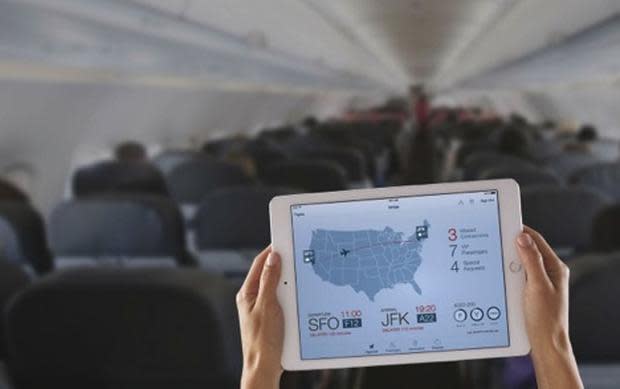IBM unveils its first 10 enterprise apps from its partnership with Apple

Earlier this year, Apple and IBM announced a huge partnership meant to allow the companies to work together in the enterprise.
Apple CEO Tim Cook said in July that the deal "takes the best of Apple and the best of IBM and puts those together."
Among other things, IBM promised to develop more than 100 iOS apps specifically for its enterprise customers, and the first 12 apps have been unveiled.
The apps were developed with input from IBM clients across a number of industries, including banking, retail, insurance, financial services, telecom, airlines, and government. Some clients have already adopted the apps, such as Citi, Air Canada, Sprint, and Banorte.
These are serious apps, too -- high-quality, custom programs that will take some customization to integrate into corporate workflows. The customization makes pricing particularly difficult, likely priced by device per month via a SaaS model. IBM will work with companies to source APIs and other data sources to populate the apps.
Let's take a look at some of these apps that were announced this week.
Advise & Grow: An app for small business-focused bankers to view all the data they need to assist their clients, including financial and credit information, with calculations done behind the scenes.
Trusted Advice: This is for financial advisors to see a client's entire financial picture on one screen, along with portfolio-modeling tools to allow advisors to show clients different possibilities for more efficient planning.
Passenger+: With tens of thousands of flight attendants in the world, along with a desperate need for improved customer service in the skies, this app allows flight attendants a bird's eye view of their charges. See VIP passengers, possible missed connections along with instant rebooking, and already stressed passengers can have an updated e-boarding pass emailed to them before they land. These things will help reduce the misery and uncertainty of flying.
Plan Flight: While flight attendants use Passenger+ in the cabin, Plan Flight is for the pilots. Many pilots already have iPads in their flight bags, but this new app focuses on pre-flight checks. Pilots can see airport traffic, plus flight and weather information specifically calibrated to fueling scenarios. Pilots can make better decisions about how much fuel they need with fewer calculations and outside inquiries, helping airlines save time and money.
"Fuel is an airline's greatest operating expense, so reducing discretionary fuel is critical to us. Today, dispatchers and pilots determine how much extra fuel is loaded onto a plane based largely on current factors and their individual judgements, which are honed by years of experience. Our work with IBM and Apple to deploy the Plan Flight app will put intelligence and insights into the hands of our dispatchers and pilots, delivering recommendations based on several variables, including weather conditions, anticipated taxi time, and historical data to determine the optimal amount of fuel for each flight." - Jim Tabor, Vice President, System Operations Control at Air Canada
Pick & Pack: Moving to retail now, this app gives sales associates real-time product information, including location and stock availability. Using iBeacon technology, a salesperson can get an in-store map of where items are located to help speed purchases.
Sales Assist: This app helps personal shoppers locate individual customers on the floor using iBeacons, look up inventory, make customized suggestions based on previous purchases, and suggest accessories based on what the customer is looking for. It can also facilitate online orders for products that are out of stock.
Retention: Aimed at insurance agents, this app lets agents keep an eye on customers to take action on situations like unpaid premiums, missing information in insurance applications, and proactive notifications on claims and customer life events. Recommended actions are prominent, helping agents get more done in less time.
Expert Tech: One of the biggest opportunities for the iPad is in telecom, where thousands of field service technicians could be made more efficient with a well-designed mobile workflow. This app can help techs get maps and traffic data to reach their destinations more efficiently, plus view customer data, diagnostics, and other information right on the tablet. Real-time video support is offered for techs who need to escalate a situation to higher-level colleagues.
Incident Aware: While there are numerous apps aimed at making public safety workers more efficient, this app allows law enforcement responders to see a bird's-eye view of a call. Cops can set up a perimeter using GPS mapping data and real-time locations of other officers, live video feeds, and more. Police records and more can be accessed, letting officials make better informed decisions.
Case Advice: This government-focused app helps give social workers a better view of their clients. Information like historical records, student assessment data, and industry guidelines help case workers make more informed decisions by seeing the whole picture. Taking the iPad out into the field can allow site visits to be more efficient vs. a traditional paper-based workflow.
IBM will use its expertise to help clients implement these and dozens of other apps to come across their companies, plus streamline procurement, deployment, and management of mobile devices. More information is available on the websites of both IBM and Apple.
Which of these apps (if any) would fit in at your organization? Let us know in the comments below.

